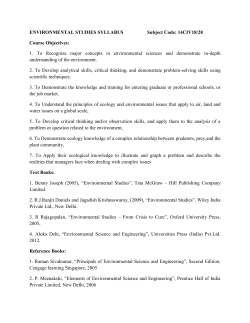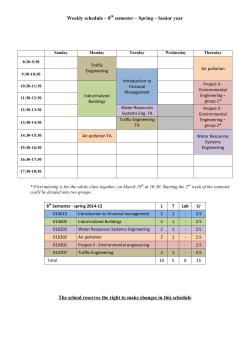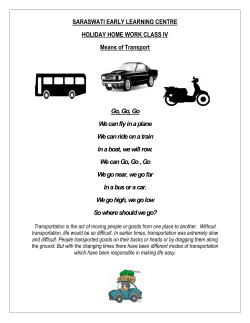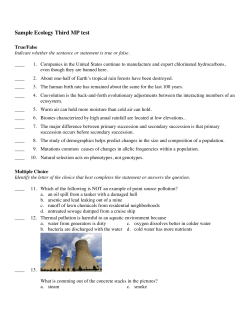
to view the school brochure
4-‐H Science on the Move is a mobile program that provides educational resources designed to increase students’ exposure and interest in Science, Technology, Engineering, and Math (STEM). For the 2014-‐2015 school year, we will be offering several standards-‐based activities for classroom instruction. All lessons match South Carolina Science Academic Standards. The impact of the programs will be evaluated by the number of children reached in each county, in addition to pre-‐ and post-‐ testing for certain activities. Grants are available in some counties to assist with the cost of certain activities. Summary Science on the Move was d eveloped by South Carolina 4-‐H and the Clemson Extension Service to follow children from kindergarten through high school, giving them the skills to further their training after graduation. This is intended to help coach students to become the prepared workforce that South Carolina needs to interest new businesses and encourage economic growth. The program includes a w ide variety of equipment and kits to give youth a unique, hands-‐on learning experience that will help them further understand science concepts. Services Imagine what your school can do through a partnership with Science on the Move! • Hands-‐on activities for classroom instruction • Educational events • After-‐school clubs through schools and community organizations • Science camps and day camps • Training and workshops for educators Elementary School 3rd Grade Be a Sound Engineer! (3-‐5.5, 3-‐5.6, 3-‐5.7, 3-‐5.8) Experiment with sound and vibrations by making string telephones. 45 minutes $40 per classroom Sand, Soil, and Bulbs (3-‐1.3, 3-‐1.4, 3-‐2.1, 3-‐2.3) Test which habitat is best for flowers grown from bulbs. 45 minutes $40 per classroom, 20 day observation time Embryology (3.2-‐1, 3-‐2.3, 3-‐2.4) Learn about the life cycle of a chicken and see it hatch in your classroom! 50 minute lesson, 21 days for eggs to hatch $20 per classroom 4th Grade Snap Circuits (4-‐5.5, 4-‐5.6, 4-‐5.7, 4-‐5.8) Allow students to experiment with electricity to learn about the components of a circuit and make light, sound, and motion! 50 minutes $30 per classroom Animal Tracks (4-‐2.5, 4-‐2.6) Discover how animals affect their environments and make an animal track to take home. 50 minutes $20 per classroom 5th Grade Coastal Enviroscape (5-‐3.6) Learn how pollution gets in the ocean, how it affects the ocean, and solutions to stop pollution. 50 minutes $50 per classroom Exploring an Ecosystem (5-‐2.2, 5-‐2.4) Learn about biotic and abiotic elements of an ecosystem by making a mini ecosystem. 45 minutes $50 per classroom Paper Rockets (5-‐5.1, 5-‐5.4, 5-‐5.5, 5-‐5.6) Students build and launch a rocket to learn about force and motion. 50 minutes $30 per classroom Middle School 6th Grade Fish Dissections (6-‐3.2) Explore the exterior and interior of a fish to learn its structures and functions. 50 minutes $80 per classroom Snap Circuits (6-‐5.2, 6-‐5.4) Allow students to experiment with electricity to learn how energy can be transformed from one form to another. 50 minutes $30 per classroom Plant Greenhouse (6-‐2.3, 6-‐2.4, 6-‐2.5, 6-‐2.7) Learn about the structures and functions of plants by starting a seed and observing its growth. 50 minutes, 20 day observation time $50 per classroom 7th Grade Capturing DNA (7-‐2.5) Isolate the DNA from fruit and get more in touch with DNA! 45 minutes $50 per classroom Enviroscape (7-‐4.5) Learn about watersheds, water pollution, and solutions to pollution. 50 minutes $50 per classroom 8th Grade The Science of Flight (8-‐5.1, 8-‐5.2, 8-‐5.3, 8-‐5.5) Explore force and motion through building and flying a model plane. 50 minutes $100 per classroom GPS (8-‐4.1, 8-‐4.7) Learn about the use of satellites in observing a planet’s surface and learn to use a GPS unit by going on a geocache. 50 minutes $80 per classroom Fossil Finds (8-‐2.2, 8-‐2.3) Explore Earth’s past environments by finding fossils! 50 minutes $50 per classroom More Program Information • • A “classroom” is defined as a group of 20-‐28 students. Most activities can be held in the classroom. Some require a science lab or an outdoor area. • Teacher training is available to train the teacher to teach the activities for $75 per hour session. Alternatively, an instructor is available to teach the activities for $40 per hour. • Any fees are due on the day of delivery. Checks can be made out to Clemson University and mailed to the address on your invoice. • All rented materials and any consumable materials not used during the activity will be returned to Science on the Move. To learn more about Science on the Move or sign up your school for activities, contact: Katie Rishebarger Science on the Move Coordinator Email: korishe@clemson.edu Cell: (803) 493-6142 scionthemove.org l facebook.com/scionthemove l @scionthemove
© Copyright 2025












